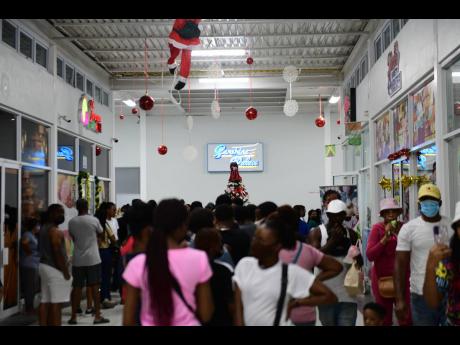Small biz backs vaccine pass
But Mahfood calls for public-sector mandate; digital card launch false-starts
Small Business Association of Jamaica (SBAJ) President Michael Leckie backs the introduction of a COVID-19 vaccine pass to avoid the return of another round of bruising lockdowns that have decimated many businesses and sparked sporadic economic...
Small Business Association of Jamaica (SBAJ) President Michael Leckie backs the introduction of a COVID-19 vaccine pass to avoid the return of another round of bruising lockdowns that have decimated many businesses and sparked sporadic economic downturns.
Such passes would restrict access to certain services and public and private spaces to fully vaccinated persons.
The recommendation comes amid growing concern about Jamaica’s languid vaccination campaign, with 19 per cent of the population fully compliant – a take-up that could threaten economic revival, especially if the emerging global variant of Omicron triggers a fourth wave here.
“In theory, we do support it because the world is changing, and for commerce to happen throughout the world, our country needs to reach vaccine immunity,” Leckie said in an interview with The Gleaner on Sunday.
Islandwide curfews dating back to April 2020 have wiped out the bottom line of many enterprises that have caused hardships for micro, small and medium-sized enterprises (MSMEs).
Some of the 8,000 MSMEs represented by the SBAJ had hoped to see some reprieve during the holiday period, but these expectations have so far not materialised.
“Sales are flat and things are pretty slow with small businesses, so we cannot afford another lockdown,” Leckie said.
“Closer to Christmas, that is when Jamaicans traditionally go out to shop, but leading up to it … nothing is happening.”
It is estimated that there are more than 430,000 small businesses in Jamaica that contribute to 78 per cent of employment in Jamaica.
Leckie revealed that up to 40 per cent of MSMEs have closed permanently since the start of the coronavirus pandemic.
Jamaica’s transition from paper-based vaccination cards to a digital model hit a snag on Monday as the much-touted launch sputtered, with health ministry officials citing technical difficulties.
Shawn Bolton, information and communications technology lead for the digital vaccination programme, said technicians were still working on the problem. He could not give a hard timeline on when the systems would be normalised.
“We encountered some issues with our servers, in terms of DNS issues. The application itself, we had some slight issues with accessing the certificates,” Bolton told The Gleaner on Monday.
DNS is domain name system.
Protests in Europe
The introduction of vaccine passes has proven to be controversial in a number of European countries, with protests rippling through the capitals pitting the police against agitated objectors.
But John Mahfood, president of one of the island’s most powerful umbrella groups, said that a vaccine pass template would not be viable at this time.
“Restaurants and supermarkets, they probably wouldn’t support it, because with less than 20 per cent vaccinated, what do you do in terms of your business? So you have to have a high level of vaccination, I believe, in order to make the pass effective,” the Jamaica Manufacturers and Exporters Association president told The Gleaner.
But Mahfood puts the brunt of responsibility for imposition of a vaccine mandate on the Government, the largest employer in Jamaica.
“Private-sector employers have been able, even without mandates, to get a high number of vaccinations, but the Government is not able to do that satisfactorily with the general public … . So I think that is where they would have to go, to mandate that public sector workers are effectively either vaccinated or they stay home,” he said.
That policy has been promulgated in Trinidad and Tobago, with the Dr Keith Rowley administration announcing that public-sector employees should be vaccinated by mid-January.
Besides exemptions on medical conditions, Rowley said that unvaccinated employees would be furloughed without pay.
Despite acknowledging government efforts to limit the virus’ spread with curfews and other restrictions, Mahfood believes that lockdowns will be inevitable amid a new wave of infections unless vaccination rates increase significantly.
That assessment was shared by Dr Leslie Meade, president-elect of the Medical Association of Jamaica (MAJ).
“We have to look at the local situation when it does arrive, and if it is what our public-health professionals think that it is necessary for a lockdown, then I think we should have one,” he told The Gleaner.
Meade stressed the need for the public to get vaccinated and access credible information from sources such as the World Health Organization.
He also expressed concern with the relaxation of COVID-19 measures in the lead-up to Christmas, but said that safety protocols such as mask wearing and social distancing would insulate most people from superspreader events.

